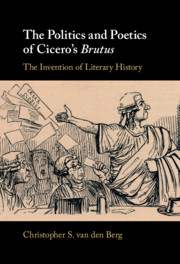Book contents
- The Politics and Poetics of Cicero’s Brutus
- The Politics and Poetics of Cicero’s Brutus
- Copyright page
- Dedication
- Contents
- Preface and Acknowledgments
- A Note on the Text
- Abbreviations
- Introduction
- Chapter 1 Ciceropaideia
- Chapter 2 The Intellectual Genealogy of the Brutus
- Chapter 3 Caesar and the Political Crisis
- Chapter 4 Truthmaking and the Past
- Chapter 5 Beginning (and) Literary History
- Chapter 6 Perfecting Literary History
- Chapter 7 Cicero’s Attici
- Chapter 8 Minerva, Venus, and Cicero’s Judgments on Caesar’s Style
- Conclusion
- References
- General Index
- Index Locorum
Chapter 6 - Perfecting Literary History
- The Politics and Poetics of Cicero’s Brutus
- The Politics and Poetics of Cicero’s Brutus
- Copyright page
- Dedication
- Contents
- Preface and Acknowledgments
- A Note on the Text
- Abbreviations
- Introduction
- Chapter 1 Ciceropaideia
- Chapter 2 The Intellectual Genealogy of the Brutus
- Chapter 3 Caesar and the Political Crisis
- Chapter 4 Truthmaking and the Past
- Chapter 5 Beginning (and) Literary History
- Chapter 6 Perfecting Literary History
- Chapter 7 Cicero’s Attici
- Chapter 8 Minerva, Venus, and Cicero’s Judgments on Caesar’s Style
- Conclusion
- References
- General Index
- Index Locorum
Summary
Chapter 6 shows how Cicero establishes a normative framework for the writing of literary history. Across the dialogue and through the various speakers he offers a sustained critique of literary historiography. Several fundamental tensions and conflicts emerge: absolute versus relative criteria in assessing literature and building canons; presentism and antiquarianism; formalism and historicism; and the recognition that all literary histories are subject to their crafters’ emphases and agendas.
Keywords
- Type
- Chapter
- Information
- The Politics and Poetics of Cicero's BrutusThe Invention of Literary History, pp. 165 - 190Publisher: Cambridge University PressPrint publication year: 2021

